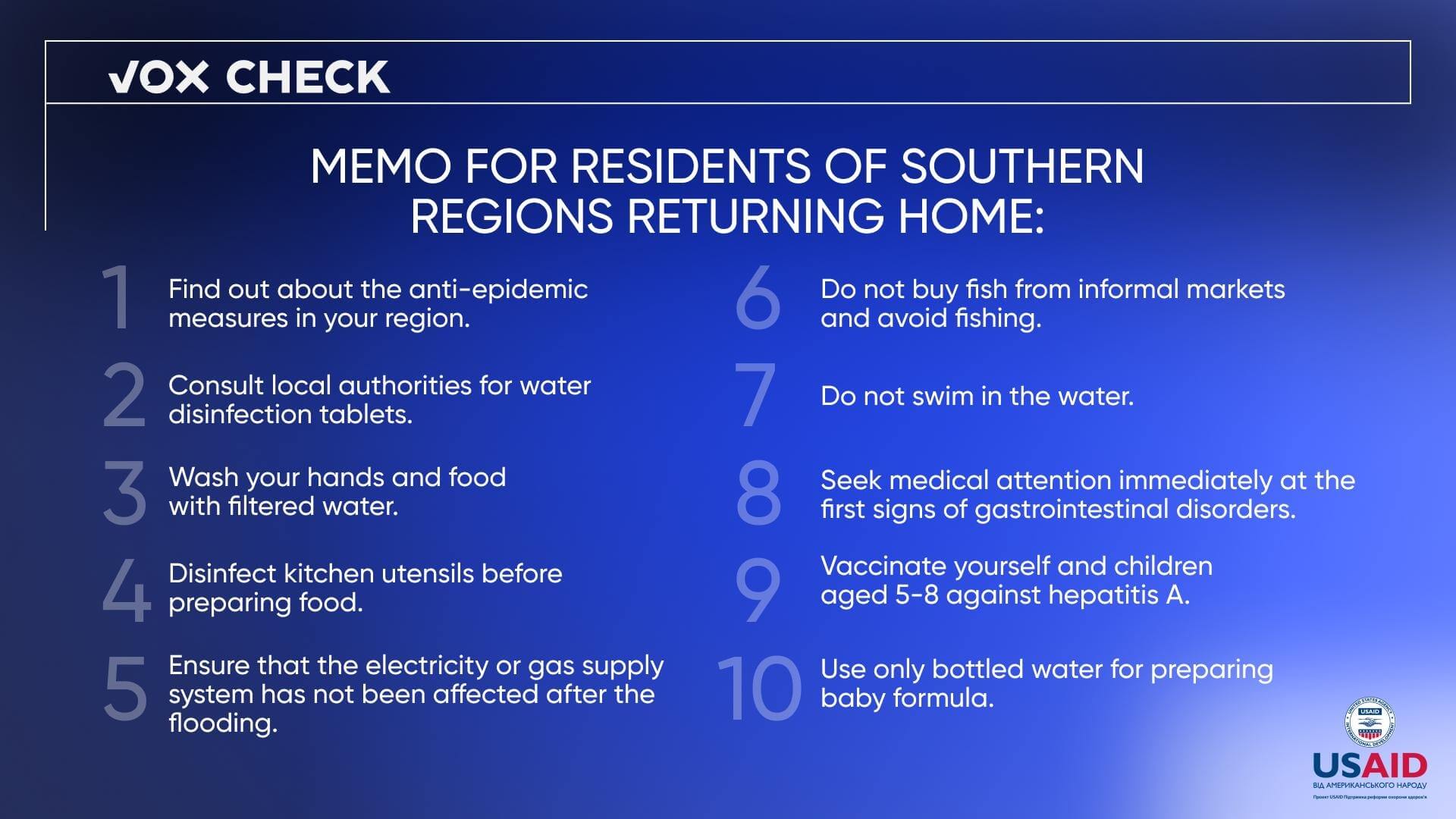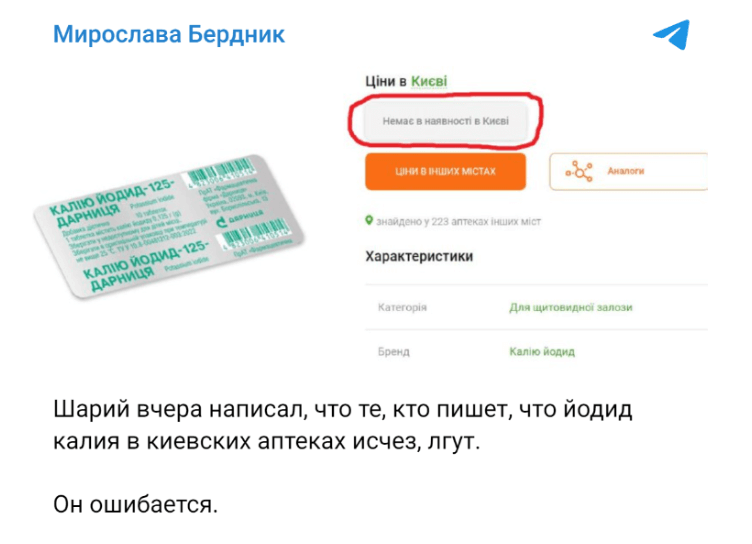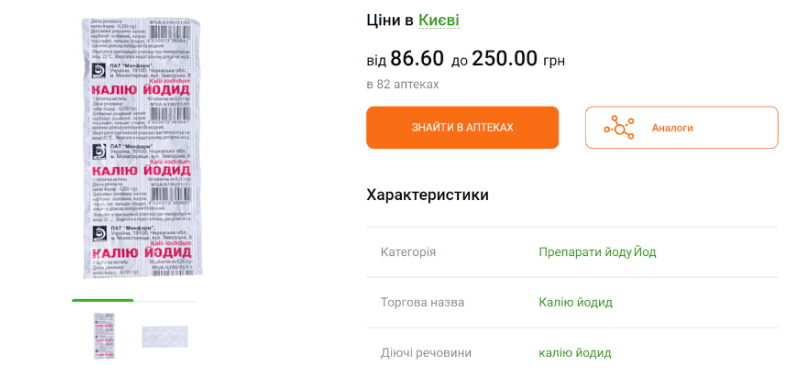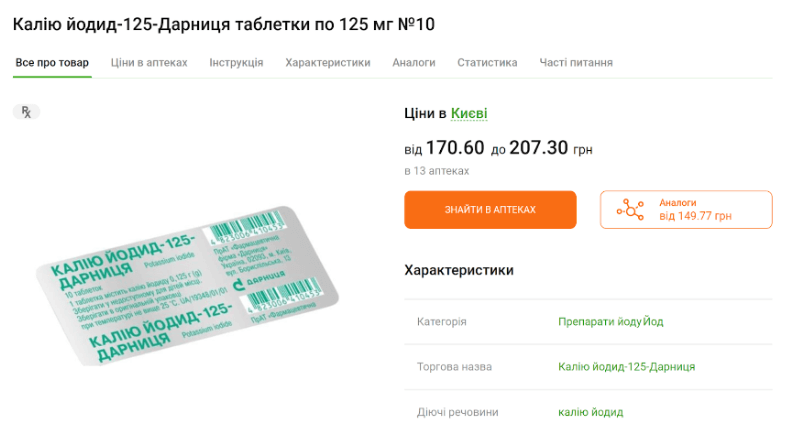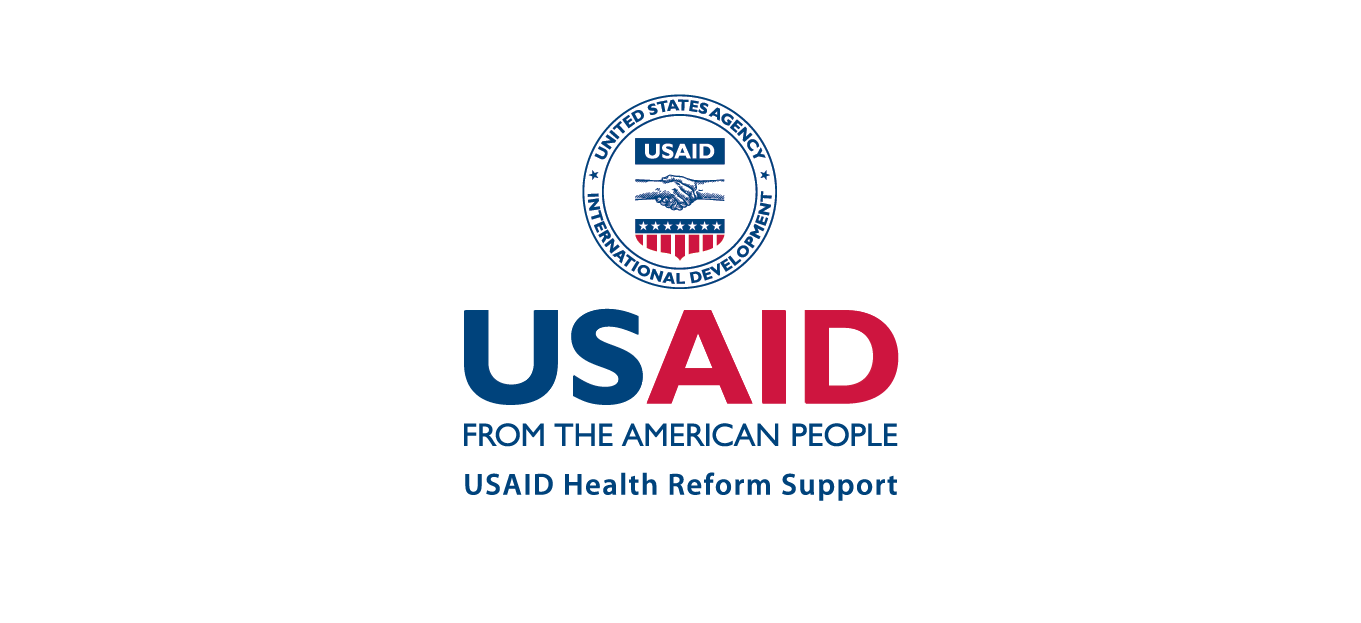This time, Russian media tried to provoke panic by spreading alarming news about topics that have been widely discussed in recent weeks: the Kakhovka Hydroelectric Power Plant and the Zaporizhzhia Nuclear Power Plant. In the first case, they focused on discrediting the medical system in Ukraine, claiming that after numerous reforms, healthcare had deteriorated and any outbreak of an infectious disease would lead to an epidemic catastrophe. In the second case, Russian sources alleged that all potassium iodide had been sold in pharmacies in Kyiv following reports of a possible explosion at the Zaporizhzhia Nuclear Power Plant.
With the support of the USAID Health Reform Support project, VoxCheck analyzes and refutes public health narratives spread in the information space of Ukraine, Belarus, and russia on a weekly basis.
Disinformation: The medical system is not ready to respond to outbreaks of infectious diseases after the explosion of the Kakhovska HPP
There is information circulating online claiming that due to failed medical reforms, the system of epidemic control has completely deteriorated and is unable to cope with infectious diseases that may arise after the explosion of the Kakhovka Hydroelectric Power Plant.
What’s the reality?
After the blowing up of the Kakhovka Hydroelectric Power Plant by Russians, Russian sources started spreading panic-inducing news about a complex epidemic situation in Ukraine. They claimed, among other things, that a cholera outbreak had been detected in Kyiv. Spreading panic and discrediting the healthcare system is advantageous for the enemy.
However, as of the beginning of July, no cases of cholera, botulism, hepatitis A, or other infectious diseases related to the consequences of flooding have been recorded in Ukraine. On June 22, Ukraine’s chief sanitary doctor, Ihor Kuzin, reported that more than 100 cholera-like vibrions had been identified since the beginning of the month, but they do not cause cholera, although the risk of the disease still remains. The State Environmental Inspection reported the presence of cholera-like vibrions in the Odesa seaport, in the waters near Inhulets, Snihurivka, in Dnipro-Buzkyi Estuary in the Mykolaiv region, and in the Kolomak and Vorskla rivers in Poltava. However, Igor Kuzin noted that there is always an increased risk of cholera outbreaks in the southern regions of Ukraine due to the high temperature, which is favorable for the reproduction of the causative agent of this disease.
He talked about a series of regular measures to counter cholera and innovations related to preparedness for possible disease outbreaks after the blowing up of the Kakhovka Hydroelectric Power Plant by the Russians on June 6, 2023. For example, every year before June 1, training is conducted to simulate a cholera situation. Additionally, from June to the end of September each year, enhanced epidemiological surveillance for cholera is implemented in the country, including monitoring the water quality in seas and rivers, inspecting food products, and conducting additional examinations of patients with gastrointestinal disorders.
Kuzin added that rapid tests are used for cholera detection, which help identify the onset of an outbreak in a timely manner, as well as PCR tests. He stated that healthcare facilities have started using detection and treatment kits for acute gastrointestinal infections recommended by the World Health Organization (WHO). Prior to the blowing up of the Kakhovka Hydroelectric Power Plant, the WHO provided kits for diagnosing and treating acute gastrointestinal infections and cholera. Fedir Lapii, the head of the National Technical Expert Group on Immunoprophylaxis, noted that in the event of a cholera outbreak, population vaccination will be carried out.
To counter the outbreak of infectious diseases, 38 water monitoring points have been established in the Odesa, Mykolaiv, and Kherson regions. Special response regimes have also been implemented in the Zaporizhia, Kherson, Odesa, Mykolaiv, and Dnipropetrovsk regions, with the formation of teams for chemical, radiation, and epidemiological surveillance. Equipment in diagnostic laboratories in Kherson and Mykolaiv has been checked. Teams are working in flood-affected cities to prevent the spread of zoonotic diseases, investigating the cause of animal deaths.
According to the Ministry of Health, hospitals in the Kherson, Mykolaiv, and Dnipropetrovsk regions will serve as hubs in the event of potential infectious disease outbreaks, and additional infectious disease beds have already been set up in these hospitals. The Cabinet of Ministers has also doubled the cost of the “Healthcare Facility Readiness Package for Providing Medical Assistance in Emergency Situations” for certain healthcare institutions in the Kherson, Mykolaiv, and Dnipropetrovsk regions to procure necessary medications. In case of an epidemic, medical professionals from neighboring regions will be mobilized, and additional infectious disease hospitals will be established in other regions.
According to the Minister of Health, Viktor Liashko, Ukraine can avoid outbreaks of infectious diseases, but it is essential to adhere to epidemiological norms: disinfect water before consumption, use only bottled water for preparing infant formula, vaccinate children against hepatitis A, refrain from swimming or fishing in flooded areas due to the blowing up of the Kakhovka Hydroelectric Power Plant.
Disinformation: In Kyiv, all potassium iodide was bought up after the announcement of the President of Ukraine about the mining of the ZNPP
At the end of June, messages appeared on social media and messengers claiming that potassium iodide tablets had disappeared from pharmacies in Kyiv. Allegedly, people started buying more potassium iodide because the President of Ukraine had frightened Ukrainians with the threat of an explosion at the Zaporizhzhia Nuclear Power Plant (ZNPP).
Screenshot of the post
What’s the reality?
On June 22, 2023, Volodymyr Zelenskyi announced that Ukrainian intelligence had received information about a possible terrorist attack by Russians at the Zaporizhzhia Nuclear Power Plant. The next day, the head of the Main Intelligence Directorate, Kyrylo Budanov, confirmed in an interview with The New Statement media that Russia had completed preparations for an attack on the Zaporizhzhia NPP. Specifically, Budanov revealed that Russia had planted explosives in the cooling pond of the plant. Without cooling, nuclear reactors can melt down within a period ranging from 10 hours to 14 days.
Against the backdrop of the Russian threat, some Ukrainian media outlets published articles about Kyiv residents actively buying potassium iodide from pharmacies. In certain pharmacies in the capital, people inquired about how to protect themselves in case of nuclear danger, but only a few individuals purchased potassium iodide. There were also pharmacies where no Kyiv resident bought any potassium iodide over the course of several days.
On several pharmacy websites, we found potassium iodide tablets available from various manufacturers. As of the end of June 2023, potassium iodide tablets from the manufacturer “Darnytsia”, which users have been sharing photos of, were available in 11 pharmacies in Kyiv. Additionally, potassium iodide can be found in Kyiv from other manufacturers as well.
Availability of potassium iodide tablets in Kyiv pharmacies as of June 27, 2023
As of July 3, 2023, tablets of potassium iodide manufactured by “Darnytsia” could be purchased in 13 pharmacies in Kyiv. Whereas pills from other manufacturers can be bought in more pharmacies.
Availability of potassium iodide tablets manufactured by “Darnytsia” in Kyiv pharmacies as of July 3, 2023
The Ministry of Health of Ukraine explains that potassium iodide should not be taken as a preventive measure. This substance is only beneficial in specific situations, at specific doses, and for certain groups of people. The Ministry notes that potassium iodide prophylaxis is only necessary in the event of an already occurred accident and after an official notification of the threat of hazardous releases. Alcohol-based iodine solutions or Lugol’s solution do not help in the case of radiation releases.
In the event of an accident, potassium iodide should be taken as follows:
- Infants up to 1 month: 16 mg;
- Children aged 1 month to 3 years: 32 mg;
- Children aged 3 to 12 years: 62.5 mg;
- Adolescents aged 13 to 18 years, adults up to 40 years, pregnant and breastfeeding women: 125 mg.
However, individuals over 40 years old are not prescribed potassium iodide. The Ministry of Health of Ukraine also recommends taking potassium iodide six hours or less before the arrival of a radioactive cloud, simultaneously with it, and six hours after. However, it is not recommended to take potassium iodide more than 24 hours after the arrival of the cloud.
This information piece was produced with the assistance of the United States Agency for International Development (USAID), provided on behalf of the people of the United States of America. This article’s content, which does not necessarily reflect the views of USAID, the United States Government, is the sole responsibility of Deloitte Consulting under contract #72012118C00001.
Attention
The authors do not work for, consult to, own shares in or receive funding from any company or organization that would benefit from this article, and have no relevant affiliations
